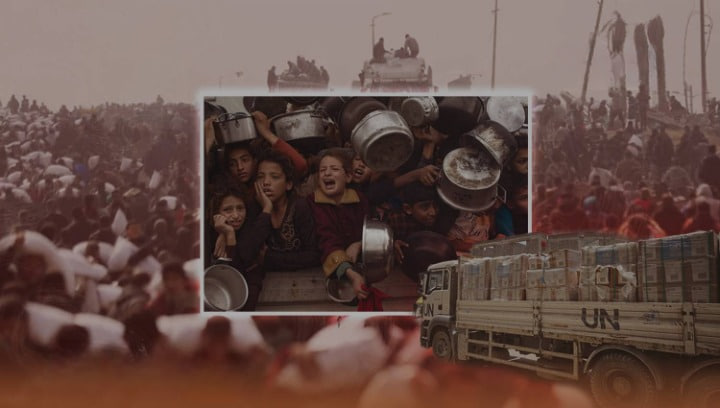Gaza Is Dying of Starvation… and Aid Turns into Death Traps
In Gaza, people are not only falling under the bombs—they are succumbing one by one and in groups to starvation. In a land whose crossings have been sealed and mercy withdrawn, a loaf of bread has become a death warrant, and an aid truck a lethal snare waiting for the sniper’s bullet.
Here, in this tiny enclave besieged for years, a silent war is waged—not with the roar of missiles or the thunder of aircraft, but with empty bellies, gaunt bodies, and eyes staring into nothingness.
Relentless Hunger
Relief reports indicate that over 90 percent of Gaza’s population suffers from acute hunger; many go to sleep without a single meal, and others have not tasted food in days. While the world speaks of “humanitarian shipments,” children are dying in their mothers’ arms—not from airstrikes, but from the void in their stomachs.
Hospitals that barely function witness infants dying in silence: mothers unable to produce milk; doctors with no equipment, no electricity, no medicines. Even schools—once places of learning—have become overcrowded shelters of fear, desperation, and hunger.
Aid … A Bullet in the Loaf
Families wait for aid convoys as if for caravans of hope, only to have them turn into scenes of massacre. In northern Gaza, dozens of starving civilians were mown down when Israeli forces opened fire on crowds waiting for food boxes. Tanks and snipers spared no one—child or elder, bread‑seeker or armed fighter—all were targets so long as they sought to live.
In one of the most horrific incidents, enemy soldiers fired on civilians gathered around a UN convoy entering via Zikim crossing. The scene was nightmarish: screams, blood, faces that moments before begged for bread now lay motionless.
Voices from the Heart of the Tragedy
Ghada al‑Kafirna, mother of ten, says:
“My children sleep in agony from hunger, sometimes for days without a meal… brackish water is our only soup.”
In Nuseirat, Ahmed Sha’at went out searching for food for his family and returned martyred by a bullet to the chest. In Khan Yunis, Yazan al‑Mussallah collapsed waiting in a relief line; his weakened body could not survive the wound, and he died in doctors’ hands while his family starved awaiting help that never came.
A small boy, returning with an empty plate, asked in a voice that could melt stone:
“Where are the armies? Why don’t they bring us food? Are we supposed to frighten them by starving?”
By the roadside, a Gazan academic carrying a blood‑stained sack of flour instead of books whispered hoarsely:
“Where are the nations? How can they leave one and a half million people to a slow death?!”
International Silence Is a Bullet
Nothing wounds Gazans more deeply than this brazen silence—Arab, Islamic, and international—as if the world has chosen to watch Gaza die over coffee. No armies have moved, no institutions have done their duty, and even the peoples could do nothing but weep.
But Gaza does not only weep: it fights with hunger, resists with life, and sends its cry to every living conscience: “We don’t want statements of condemnation; we want food, we want medicine, we want life.”
Death as a Systematic Weapon
Hunger in Gaza is not an accident—it is a deliberate weapon employed by the Zionist enemy to strangle civilians, forcing them to surrender, flee, or die. It is a slow genocide carried out under international cover—no smoke, but its stench chokes the conscience of the world.
In this darkness, Gaza remains defiant—its heart still beating despite death, hunger, and betrayal. It still pulses, still waits for someone to stand by it, to hear its cry, to open the corridors of life.
There Is No Time to Wait
Gaza does not ask for miracles—only that the aggression end, the siege be lifted, that aid enter without bloodshed, that children be allowed childhood, mothers the right to live, and patients the right to treatment.
Hunger needs no cameras—it needs consciences. Today, Gaza, with its hunger and blood, writes on the walls of death: “Enough silence, enough betrayal—open the passages at once… for life does not wait.”

